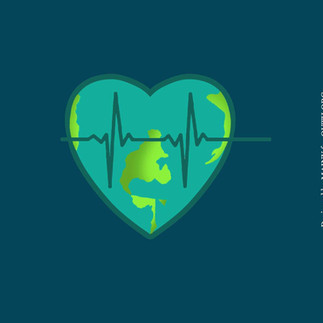Right Answers? They are a Myth
- Laura Degiovanni ䷼ | CEO TiiQu & Founder QuTii Foundation
- Dec 19, 2022
- 3 min read
Updated: Dec 20, 2022
Illustration by Mainy
On one side we have questioning platforms that start replacing thinking with AI, on the other side we have compulsive "thinkers" who influence others by saying something that actually means the opposite. Are these the channels that will govern information consumption in the coming years?
"Why is climate change alarmism amoral? The show of moving to sustainable fuels and demonstrating against fossil fuels has an intoxicating allure to those with a social conscience. Who would not want to reduce CO2 emissions? It is an unbelievable irony that when your climate change policy limits access to cheap energy, you force the poorest in society to pay. Increasing energy costs drive reduced work that leads to reduced productivity which is conducive to increased poverty."
The person who wrote this paragraph wants you to believe something. Generally, those who create Web pages, editorials, books or magazine articles try to change or shape your perceptions or beliefs. To form your own opinion, you must first identify the idea pushed to you. In some cases, this is an easier job than in others. It is all about the questions that you ask.
Critical thinking is about investigating what is behind the information and bringing together elements that deserve to form your view. Human beings pressed to take a position quickly or to solve complexity tend to take decisions quickly and typically look for the right answers from others.
Right answers? They are a myth
The good news is that the right questions can lead to the truth we chase.
Shifting from scouting the right answers to asking the right questions is about acquiring a different attitude and moving on to systematically questioning what we are told to feed our critical thinking ability.
AI is Fast and Correct. Yes, but is that the point?
Fast and correct is the promise of the AI-driven ChatGPT founded by Elon Musk, and Sam Altman. The tool may be ethically disputable nevertheless it operates in seconds and provides the "right" answers. My only question is: right for whom?
What questions unlock taxonomy issues
Why, how and even how many questions may rely on very different truths that depend on our perspectives.
Scientifically provable questions may rely on different theories.
Machines can significantly help humans to succeed in thinking faster and better.
Emerging technologies can do the entire job for you, or only part of it, the other part can be done by third parties with specific interests or yourself. You decide what is best for you.
For some may be the only truly owned decision they make.

If you don't like the idea of machines or vested interests forging your thoughts, you may want to learn to ask the right questions, open your horizons to unchartered views and be the only one to put together the elements that feed and form your thinking.
Advocating for the truth is fundamentally exercising the right to think. That is what AOT stand for
Updates about the AOT work
We are at Newsletter n.6 to inform you about the progress on the QuTii platform. For those who don't know, AOT are independent contributors who research and publish environment-related topics with the aim to feed the online library QuTii where information is subsequently implemented and co-validated by scientists, technologists, policymakers, innovators and researchers.
Most of AOT are currently focused on environmental topics, with some working on social sustainability, youth and diversity and inclusion.
Nature-positive urban development here
Food production impacts here
Marine and coastal habits here
COP27 decision documents | Global environment facility here
COP27 Paris Committee on capacity building for 2022 here
Clean energy investments here
Cities' impact on nature here
Biodiversity Decline here
Biodiversity indicators here
Soil biodiversity here
Plants diversity here
Impact of biodiversity on malnutrition here
Drivers of biodiversity loss here
No Net Loss in biodiversity (NNL) here
COP27 Documents | Report of the Paris Committee on Capacity-building for 2022 here
COP27 Documents | 5th Biennial Assessment and Overview of Climate Finance Flows here
COP27 Decision documents - Revision of the UNF CCC reporting guidelines here
Clean energy investments here
Warsaw International Mechanism for Loss and Damage here
Treaty implementation and compliance here
Standing Committee on Finance here
The Green Climate Fund here
Emissions Global Landscape 2022 here
The climate change glossary here
Decarbonization in Japan here
Decarbonization Day: MARS here
Adaptation Agenda here
Climate change evidence here
Innovative finance here
Investment emissions here
Elements of reform here
Assessing and measuring risk and cost of capital here
Debt sustainability here
Insure against shock here
The carbon credit scheme here
Private philanthropy and aligning financial flows here
Finance for climate action here
Food security here
Just transition here
Youth Day -Youth Global issues here
Youth-led Climate Forum here
You can join other AOT and play your part, learn more today F.A.Q. about the QuTii project We come back Next Newsletter Monday 26. (On LinkedIn or here)
And now is the time for AOT cartoons, enjoy Episode n.5!
.png)














Comments